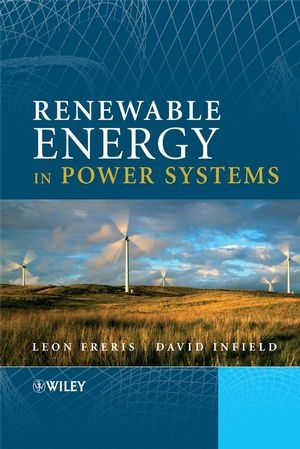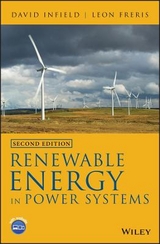
Renewable Energy in Power Systems
Wiley-Blackwell (Verlag)
978-0-470-01749-4 (ISBN)
- Titel erscheint in neuer Auflage
- Artikel merken
This new book addresses these special issues and covers the following: The characteristics of conventional and RE generators with particular reference to the variable nature of RE from wind, solar, small hydro and marine sources over time scales ranging from seconds to months The power balance and frequency stability in a network with increasing inputs from variable sources and the technical and economic implications of increased penetration from such sources with special reference to demand side management The conversion of energy into electricity from RE sources and the type and characteristics of generators used The requirement to condition the power from RE sources and the type and mode of operation of the power electronic converters used to interface such generators to the grid The flow of power over networks supplied from conventional plus RE sources with particular reference to voltage control and protection The economics and trading of 'green' electricity in national and international deregulated markets The expected developments in RE technology and the future shape of power systems where the penetration from RE sources is large and where substantial operational and control benefits will be derived from extensive use of power electronic interfaces and controllers The text is designed to be intelligible to readers who have little previous knowledge of electrical engineering.
The more analytical electrical aspects are relegated to an Appendix for readers who wish to gain a more in depth understanding. The book's flexible structure makes its accessible to the general engineer or scientists but also caters for readers with a non-scientific background. Economists, planners and environmental specialists will find parts of the book informative.
Professor Leon Freris, CREST, Loughborough University, Loughborough, Leicestershire Professor Leon Freris is the visiting professor in Renewable Energy Technology in the Center for Renewable Energy Systems Technology (CREST) at Loughborough University. Professor Freris has over 20 years of teaching experience on a variety of topics related to wind power and integration of renewables.
Foreword . Preface . Acknowledgements . 1 Energy and Electricity . 1.1 The World Energy Scene. 1.2 The Environmental Impact of Energy Use. 1.3 Generating Electricity. 1.4 The Electrical Power System. References. 2 Features of Conventional and Renewable Generation . 2.1 Introduction. 2.2 Conventional Sources: Coal, Gas and Nuclear. 2.3 Hydroelectric Power. 2.4 Wind Power. 2.5 PV and Solar Thermal Electricity. 2.6 Tidal Power. 2.7 Wave Power. 2.8 Biomass. 2.9 Summary of Power Generation Characteristics. 2.10 Combining Sources. References. 3 Power Balance/ Frequency Control . 3.1 Introduction. 3.2 Electricity Demand. 3.3 Power Governing. 3.4 Dynamic Frequency Control of Large Systems. 3.5 Impact of Renewable Generation on Frequency Control and Reliability. 3.6 Frequency Response Services from Renewables. 3.7 Frequency Control Modelling. 3.8 Energy Storage. References. Other Useful Reading. 4 Electrical Power Generation and Conditioning . 4.1 The Conversion of Renewable Energy into Electrical Form. 4.2 The Synchronous Generator. 4.3 The Transformer. 4.4 The Asynchronous Generator. 4.5 Power Electronics. 4.6 Applications to Renewable Energy Generators. References. 5 Power System Analysis . 5.1 Introduction. 5.2 The Transmission System. 5.3 Voltage Control. 5.4 Power Flow in an Individual Section of Line. 5.5 Reactive Power Management. 5.6 Load Flow and Power System Simulation. 5.7 Faults and Protection. 5.8 Time Varying and Dynamic Simulations. 5.9 Reliability Analysis. References. 6 Renewable Energy Generation in Power Systems . 6.1 Distributed Generation. 6.2 Voltage Effects. 6.3 Thermal Limits. 6.4 Other Embedded Generation Issues. 6.5 Islanding. 6.6 Fault Ride-through. 6.7 Generator and Converter Characteristics. References. 7 Power System Economics and the Electricity Market . 7.1 Introduction. 7.2 The Costs of Electricity Generation. 7.3 Economic Optimization in Power Systems. 7.4 External Costs. 7.5 Effects of Embedded Generation. 7.6 Support Mechanisms for Renewable Energy. 7.7 Electricity Trading. References. 8 The Future - Towards a Sustainable Electricity Supply System . 8.1 Introduction. 8.2 The Future of Wind Power. 8.3 The Future of Solar Power. 8.4 The Future of Biofuels. 8.5 The Future of Hydro and Marine Power. 8.6 Distributed Generation and the Shape of Future Networks. 8.7 Conclusions. References. Appendix: Basic Electric Power Engineering Concepts . A.1 Introduction. A.2 Generators and Consumers of Energy. A.3 Why AC?. A.4 AC Waveforms. A.5 Response of Circuit Components to AC. A.6 Phasors. A.7 Phasor Addition. A.8 Rectangular Notation. A.9 Reactance and Impedance. A.10 Power in AC Circuits. A.11 Reactive Power. A.12 Complex Power. A.13 Conservation of Active and Reactive Power. A.14 Effects of Reactive Power Flow - Power Factor Correction. A.15 Three-phase AC. A.16 The Thevenin Equivalent Circuit. Reference. Index.
| Verlagsort | Hoboken |
|---|---|
| Sprache | englisch |
| Maße | 172 x 252 mm |
| Gewicht | 642 g |
| Themenwelt | Naturwissenschaften ► Biologie ► Ökologie / Naturschutz |
| Technik ► Elektrotechnik / Energietechnik | |
| Technik ► Umwelttechnik / Biotechnologie | |
| ISBN-10 | 0-470-01749-X / 047001749X |
| ISBN-13 | 978-0-470-01749-4 / 9780470017494 |
| Zustand | Neuware |
| Haben Sie eine Frage zum Produkt? |
aus dem Bereich



